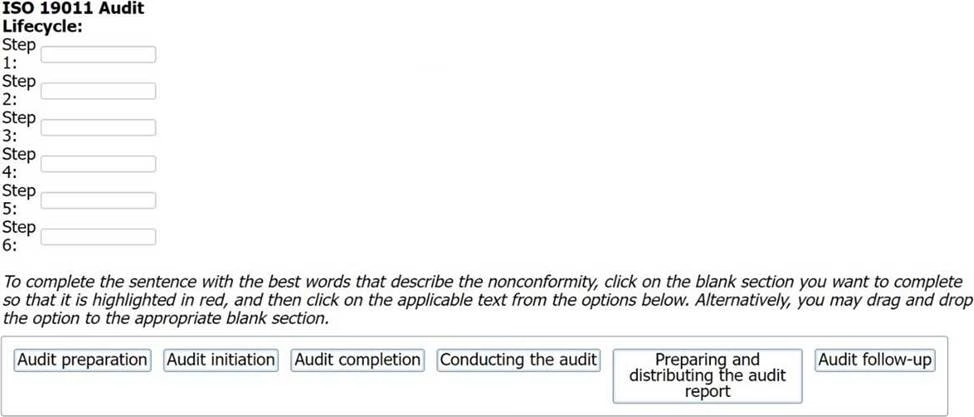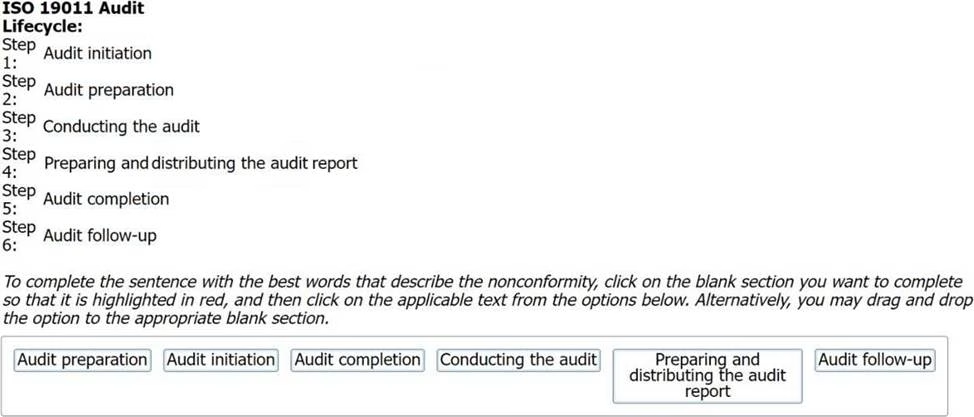You are the person responsible for managing the audit programme and deciding the size and composition of the audit team for a specific audit. Select the two factors that should be considered.
- A . The audit scope and criteria
- B . Customer relationships
- C . The overall competence of the audit team needed to achieve audit objectives
- D . Seniority of the audit team leader
- E . The cost of the audit
- F . The duration preferred by the auditee
Reveal Solution Hide Solution
Correct Answer: AC
AC
Explanation:
The overall competence of the12:
The audit scope and criteria: The audit scope defines the extent and boundaries of the audit, such as the locations, processes, functions, and time period to be audited. The audit criteria are the set of policies, procedures, standards, or requirements used as a reference against which the audit evidence is compared. The audit scope and criteria determine the complexity and extent of the audit, and thus influence the number and expertise of the auditors needed to cover all the relevant aspects of the audit.
The overall competence of the audit team needed to achieve audit objectives: The audit team should have the appropriate knowledge, skills, and experience to conduct the audit effectively and efficiently, and to provide credible and reliable audit results. The audit team competence should include the following elements12:
Generic competence: The ability to apply the principles and methods of auditing, such as planning, conducting, reporting, and following up the audit, as well as the personal behaviour and attributes of the auditors, such as ethical conduct, fair presentation, professional care, independence, and impartiality.
Discipline and sector-specific competence: The ability to understand and apply the audit criteria and the relevant technical or industry aspects of the audited organization, such as the information security management system (ISMS) requirements, the information security risks and controls, the legal and regulatory obligations, the organizational context and culture, the processes and activities, the products and services, etc.
Audit team leader competence: The ability to manage the audit team and the audit process, such as coordinating the audit activities, communicating with the audit programme manager and the auditee, resolving any audit-related problems, ensuring the quality and consistency of the audit work and the audit report, etc.
The person responsible for managing the audit programme should not consider the following factors when deciding the size and composition of the audit team for a specific audit, as they are either irrelevant or inappropriate for the audit process12:
Customer relationships: The audit team should not be influenced by any personal or professional relationships with the auditee or other interested parties, as this may compromise the objectivity and impartiality of the audit. The audit team should avoid any conflicts of interest or self-interest that may affect the audit results or the audit decisions.
Seniority of the audit team leader: The audit team leader should be selected based on their competence and experience, not on their seniority or rank within the organization or the audit programme. The audit team leader should have the authority and responsibility to manage the audit team and the audit process, regardless of their seniority or position.
The cost of the audit: The cost of the audit should not be the primary factor for determining the size and composition of the audit team, as this may compromise the quality and effectiveness of the audit. The audit team should have sufficient resources and time to conduct the audit in accordance with the audit objectives, scope, and criteria, and to provide accurate and reliable audit results and recommendations.
The duration preferred by the auditee: The duration of the audit should be based on the audit objectives, scope, and criteria, and the availability and cooperation of the auditee, not on the preference or convenience of the auditee. The audit team should have enough time to conduct the audit in a thorough and systematic manner, and to collect and evaluate sufficient and relevant audit evidence.
Reference: ISO 19011:2018 – Guidelines for auditing management systems PECB Candidate Handbook ISO 27001 Lead Auditor, pages 19-20



